Module 8 My future life Unit 3 Language in use课件(共22张PPT) 2024-2025学年英语外研版九年级下册
文档属性
| 名称 | Module 8 My future life Unit 3 Language in use课件(共22张PPT) 2024-2025学年英语外研版九年级下册 |

|
|
| 格式 | ppt | ||
| 文件大小 | 1.9MB | ||
| 资源类型 | 教案 | ||
| 版本资源 | 外研版 | ||
| 科目 | 英语 | ||
| 更新时间 | 2024-11-21 00:00:00 | ||
图片预览

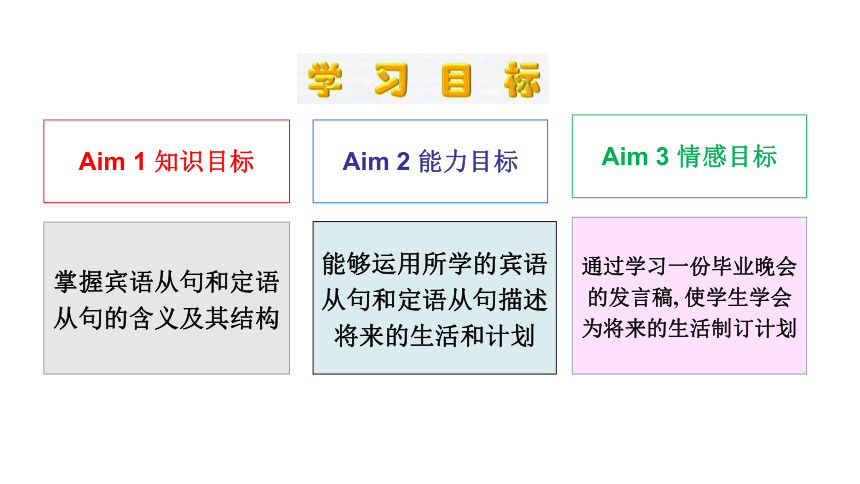
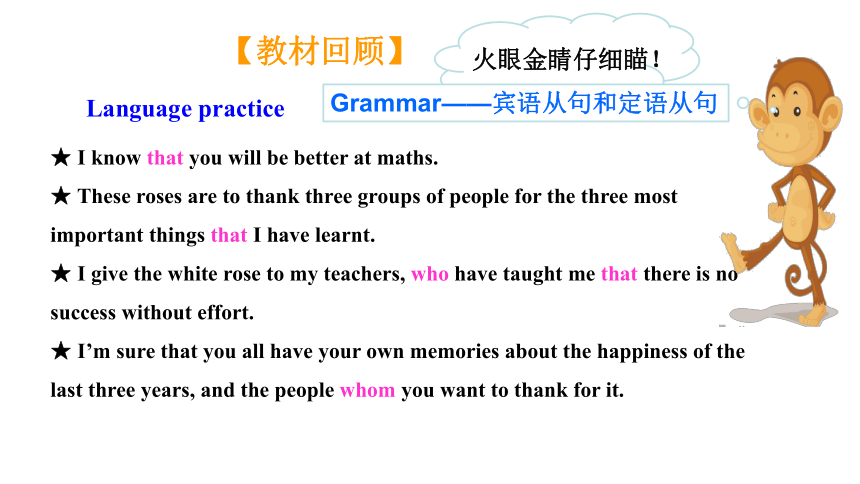
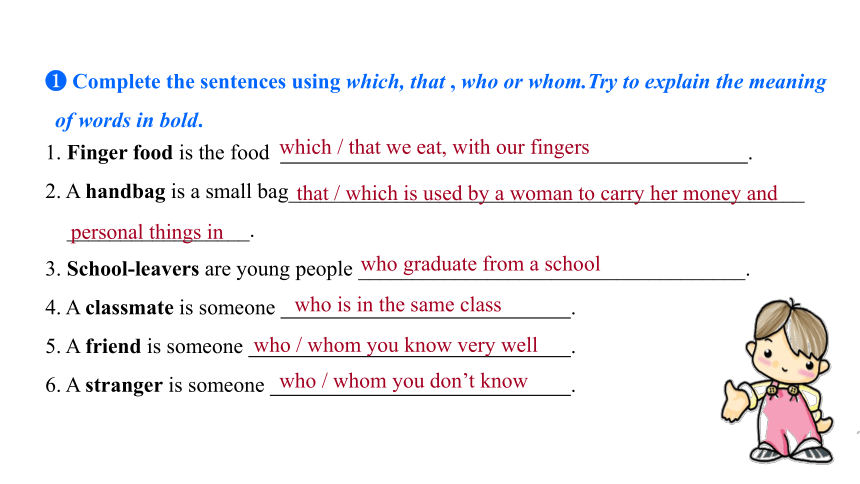
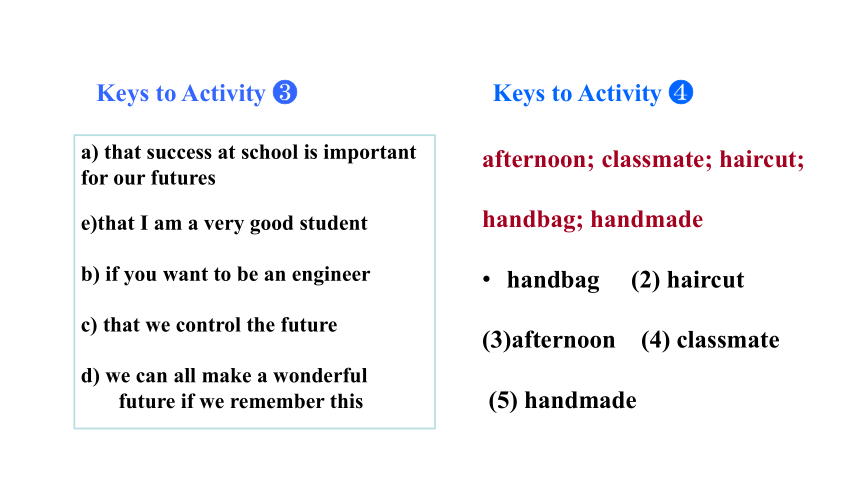
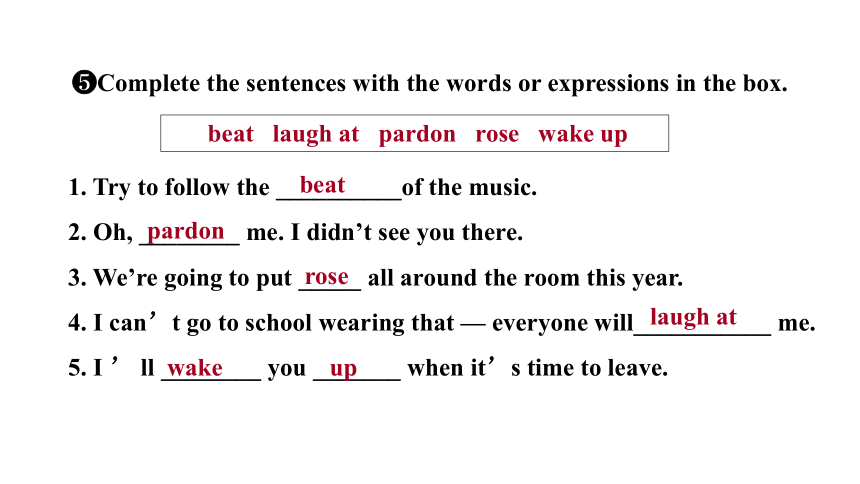

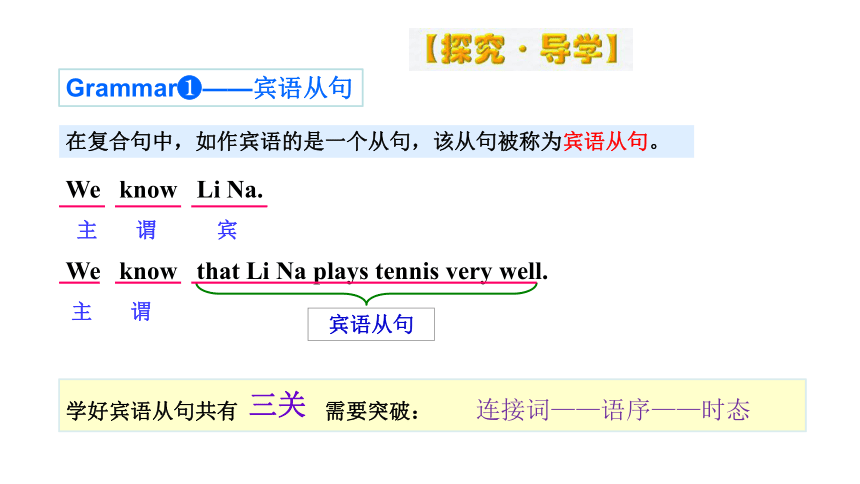
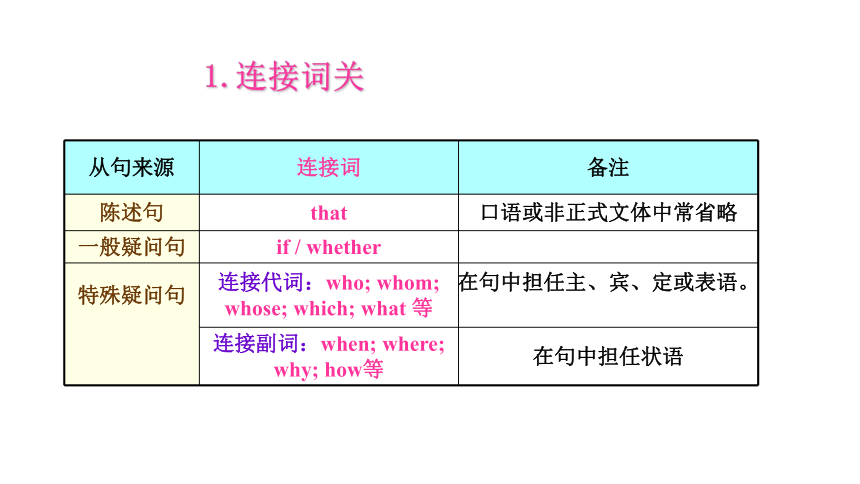
文档简介
(共22张PPT)
Module 8 My future life
Unit 3 Language in use
掌握宾语从句和定语从句的含义及其结构
Aim 1 知识目标
能够运用所学的宾语从句和定语从句描述将来的生活和计划
Aim 2 能力目标
通过学习一份毕业晚会的发言稿, 使学生学会为将来的生活制订计划
Aim 3 情感目标
★ I know that you will be better at maths.
★ These roses are to thank three groups of people for the three most important things that I have learnt.
★ I give the white rose to my teachers, who have taught me that there is no success without effort.
★ I’m sure that you all have your own memories about the happiness of the last three years, and the people whom you want to thank for it.
火眼金睛仔细瞄!
Language practice
【教材回顾】
Grammar——宾语从句和定语从句
1. Finger food is the food .
2. A handbag is a small bag________________________________________________
_________________.
3. School-leavers are young people ____________________________________.
4. A classmate is someone .
5. A friend is someone .
6. A stranger is someone .
which / that we eat, with our fingers
that / which is used by a woman to carry her money and personal things in
who graduate from a school
who is in the same class
who / whom you know very well
who / whom you don’t know
Complete the sentences using which, that , who or whom.Try to explain the meaning of words in bold.
a) that success at school is important for our futures
e)that I am a very good student
b) if you want to be an engineer
c) that we control the future
d) we can all make a wonderful future if we remember this
Keys to Activity
afternoon; classmate; haircut;
handbag; handmade
handbag (2) haircut
(3)afternoon (4) classmate
(5) handmade
Keys to Activity
1. Try to follow the __________of the music.
2. Oh, ________ me. I didn’t see you there.
3. We’re going to put _____ all around the room this year.
4. I can’t go to school wearing that — everyone will___________ me.
5. I ’ ll ________ you _______ when it’s time to leave.
beat
Complete the sentences with the words or expressions in the box.
beat laugh at pardon rose wake up
pardon
rose
laugh at
wake up
2. Why did Mark choose to go to vocational school
a) Because he wanted to know more about society.
b) Because he finished secondary school.
c) Because he found that he was better at doing things than at reading books.
d) Because he did not do well at school.
3. According to the passage, which of the following is NOT the reason why Mark made his choice
a) Everyone needs a skill for a good life in the future.
b) He can study the things that he likes best.
c) The society needs not just people who work in an office, but also those who can make things and repair things. d) He likes physics.
Read the passage and choose the correct answer.
1. What do students at the vocational schools do
a) They look for jobs there. b) They learn how to do many of the jobs that are needed
in society.
c) They study why the jobs are needed in society.
d) They do the same as students in secondary school.
在复合句中,如作宾语的是一个从句,该从句被称为宾语从句。
Grammar ——宾语从句
We know Li Na.
主 谓 宾
We know that Li Na plays tennis very well.
主 谓
宾语从句
学好宾语从句共有 需要突破: 连接词——语序——时态
三关
1.连接词关
从句来源 连接词 备注
陈述句 that 口语或非正式文体中常省略
一般疑问句 if / whether
特殊疑问句 连接代词:who; whom; whose; which; what 等 在句中担任主、宾、定或表语。
连接副词:when; where; why; how等 在句中担任状语
①陈述句变为宾语从句,语序不变,即仍用陈述语序。例如:
He is an honest boy. The teacher said.
→The teacher said(that)he was an honest boy.
②一般疑问句和特殊疑问句变为宾语从句,语序变为陈述语序。例如:
Does he work hard?I wonder.
→I wonder if/whether he works hard.
When did he leave?I don’t know.
→I don’t know when he left.
2. 语序关
①如果主句是现在的时态,从句的时态可根据实际情况而定。例如:
I have heard(that)he will come back next week.
②如果主句是过去的某种时态,那么从句的时态一定要用过去的某种时态。例如:
He said(that)there were no classes yesterday.
注意:如果宾语从句表述的是客观真理、自然现象等时,不管主句是什么时态,从句都要用一般现在时。例如:He said that light travels much faster than sound.
3. 时态关
在复合句中,如作定语的是一个从句,该从句被称为定语从句。
Grammar ——定语从句
Look at the photos (that) I took on my trip.
关系词
先行词
定语从句
先行词: 是被定语从句所修饰的词 (通常是名词或代词)
关系词的作用:1.引导定语从句 2.在从句中替代先行词,在定语从句中充当一定的成分,通常是主语或宾语,作宾语时常可以省略。
定语从句:
先行词 + 关系词(that/which/who)+从句
修饰
先行词 关系词
指人 that (作主语、宾语或表语)
who (作主语、宾语或表语)
whom (作宾语)
指物 that (作主语、宾语或表语)
which (作主语或宾语)
Who is the girl that talked to you yesterday?
关系词在从句中作主语
先行词是人
Look at the photos (that) I took on my trip.
关系词在从句中作宾语
先行词是物
定语从句
定语从句
It successfully shows the rich culture which makes Beijing so famous.
关系词在从句中作主语
先行词是物
The photo (which) we liked best was taken by Zhao Min.
先行词是物
关系词在从句中作宾语
His father is the person who will be most unhappy.
先行词是人
关系词在从句中作主语
Tom is the boy (who/whom) we saw in the shop.
先行词是人
关系词在从句中作宾语
在先行词是物的定语从句中,一般情况下that和which都可以通用, 但在下列情况下, 一般用 that 而不用which。
I am sure she has something that you can borrow.
1. 先行词为all, everything, nothing, something, anything, little, much 等不定代词时。
I’ve read all the books that are not mine.
2. 先行词被all, little, much, every, no 等修饰时。
This is the very book that belongs to him.
4. 先行词被the only, the very, the same, the last修饰时。
5. 先行词为人和物的组合。
They talked for an hour of things and persons that they remembered in the school.
3. 先行词被序数词或最高级修饰时。
This is the first book that he has read.
知识方面
Revise& master the new words and expressions.
Revise& master some important sentences.
能够运用所学的宾语从句和定语从句描述将来的生活和计划
能力方面
掌握宾语从句和定语从句的含义及其结构
1.—Does anyone know the famous scientist was born —I know! In New York.
A. when B. why C. whether D. where
2.—I want to know . —Because he has to look after his little sister.
A. why he is leaving B. why is he leaving C. whether he is leaving
3.— How soon will you start your journey — I’m not sure. I haven’t decided .
A. when shall I ask the boss for leave B. where I will go to spend the holiday
C. whether I would go by train or by plane D. who could invite me to go
Grammar ——宾语从句
4. A kind of shared bike _____ is called bluegogo is getting more and more popular in Chengdu.
A. it B. who C. which D. this
5. I like the TV shows _______ make me laugh happily.
A. who B. what C. whom D. that
6. The Palace Museum is the best place _____ I’ve ever visited.
A. that B. which C. where D. what
Grammar ——定语从句
If winter comes , can spring be far behind
冬天来了,春天还会远吗
Module 8 My future life
Unit 3 Language in use
掌握宾语从句和定语从句的含义及其结构
Aim 1 知识目标
能够运用所学的宾语从句和定语从句描述将来的生活和计划
Aim 2 能力目标
通过学习一份毕业晚会的发言稿, 使学生学会为将来的生活制订计划
Aim 3 情感目标
★ I know that you will be better at maths.
★ These roses are to thank three groups of people for the three most important things that I have learnt.
★ I give the white rose to my teachers, who have taught me that there is no success without effort.
★ I’m sure that you all have your own memories about the happiness of the last three years, and the people whom you want to thank for it.
火眼金睛仔细瞄!
Language practice
【教材回顾】
Grammar——宾语从句和定语从句
1. Finger food is the food .
2. A handbag is a small bag________________________________________________
_________________.
3. School-leavers are young people ____________________________________.
4. A classmate is someone .
5. A friend is someone .
6. A stranger is someone .
which / that we eat, with our fingers
that / which is used by a woman to carry her money and personal things in
who graduate from a school
who is in the same class
who / whom you know very well
who / whom you don’t know
Complete the sentences using which, that , who or whom.Try to explain the meaning of words in bold.
a) that success at school is important for our futures
e)that I am a very good student
b) if you want to be an engineer
c) that we control the future
d) we can all make a wonderful future if we remember this
Keys to Activity
afternoon; classmate; haircut;
handbag; handmade
handbag (2) haircut
(3)afternoon (4) classmate
(5) handmade
Keys to Activity
1. Try to follow the __________of the music.
2. Oh, ________ me. I didn’t see you there.
3. We’re going to put _____ all around the room this year.
4. I can’t go to school wearing that — everyone will___________ me.
5. I ’ ll ________ you _______ when it’s time to leave.
beat
Complete the sentences with the words or expressions in the box.
beat laugh at pardon rose wake up
pardon
rose
laugh at
wake up
2. Why did Mark choose to go to vocational school
a) Because he wanted to know more about society.
b) Because he finished secondary school.
c) Because he found that he was better at doing things than at reading books.
d) Because he did not do well at school.
3. According to the passage, which of the following is NOT the reason why Mark made his choice
a) Everyone needs a skill for a good life in the future.
b) He can study the things that he likes best.
c) The society needs not just people who work in an office, but also those who can make things and repair things. d) He likes physics.
Read the passage and choose the correct answer.
1. What do students at the vocational schools do
a) They look for jobs there. b) They learn how to do many of the jobs that are needed
in society.
c) They study why the jobs are needed in society.
d) They do the same as students in secondary school.
在复合句中,如作宾语的是一个从句,该从句被称为宾语从句。
Grammar ——宾语从句
We know Li Na.
主 谓 宾
We know that Li Na plays tennis very well.
主 谓
宾语从句
学好宾语从句共有 需要突破: 连接词——语序——时态
三关
1.连接词关
从句来源 连接词 备注
陈述句 that 口语或非正式文体中常省略
一般疑问句 if / whether
特殊疑问句 连接代词:who; whom; whose; which; what 等 在句中担任主、宾、定或表语。
连接副词:when; where; why; how等 在句中担任状语
①陈述句变为宾语从句,语序不变,即仍用陈述语序。例如:
He is an honest boy. The teacher said.
→The teacher said(that)he was an honest boy.
②一般疑问句和特殊疑问句变为宾语从句,语序变为陈述语序。例如:
Does he work hard?I wonder.
→I wonder if/whether he works hard.
When did he leave?I don’t know.
→I don’t know when he left.
2. 语序关
①如果主句是现在的时态,从句的时态可根据实际情况而定。例如:
I have heard(that)he will come back next week.
②如果主句是过去的某种时态,那么从句的时态一定要用过去的某种时态。例如:
He said(that)there were no classes yesterday.
注意:如果宾语从句表述的是客观真理、自然现象等时,不管主句是什么时态,从句都要用一般现在时。例如:He said that light travels much faster than sound.
3. 时态关
在复合句中,如作定语的是一个从句,该从句被称为定语从句。
Grammar ——定语从句
Look at the photos (that) I took on my trip.
关系词
先行词
定语从句
先行词: 是被定语从句所修饰的词 (通常是名词或代词)
关系词的作用:1.引导定语从句 2.在从句中替代先行词,在定语从句中充当一定的成分,通常是主语或宾语,作宾语时常可以省略。
定语从句:
先行词 + 关系词(that/which/who)+从句
修饰
先行词 关系词
指人 that (作主语、宾语或表语)
who (作主语、宾语或表语)
whom (作宾语)
指物 that (作主语、宾语或表语)
which (作主语或宾语)
Who is the girl that talked to you yesterday?
关系词在从句中作主语
先行词是人
Look at the photos (that) I took on my trip.
关系词在从句中作宾语
先行词是物
定语从句
定语从句
It successfully shows the rich culture which makes Beijing so famous.
关系词在从句中作主语
先行词是物
The photo (which) we liked best was taken by Zhao Min.
先行词是物
关系词在从句中作宾语
His father is the person who will be most unhappy.
先行词是人
关系词在从句中作主语
Tom is the boy (who/whom) we saw in the shop.
先行词是人
关系词在从句中作宾语
在先行词是物的定语从句中,一般情况下that和which都可以通用, 但在下列情况下, 一般用 that 而不用which。
I am sure she has something that you can borrow.
1. 先行词为all, everything, nothing, something, anything, little, much 等不定代词时。
I’ve read all the books that are not mine.
2. 先行词被all, little, much, every, no 等修饰时。
This is the very book that belongs to him.
4. 先行词被the only, the very, the same, the last修饰时。
5. 先行词为人和物的组合。
They talked for an hour of things and persons that they remembered in the school.
3. 先行词被序数词或最高级修饰时。
This is the first book that he has read.
知识方面
Revise& master the new words and expressions.
Revise& master some important sentences.
能够运用所学的宾语从句和定语从句描述将来的生活和计划
能力方面
掌握宾语从句和定语从句的含义及其结构
1.—Does anyone know the famous scientist was born —I know! In New York.
A. when B. why C. whether D. where
2.—I want to know . —Because he has to look after his little sister.
A. why he is leaving B. why is he leaving C. whether he is leaving
3.— How soon will you start your journey — I’m not sure. I haven’t decided .
A. when shall I ask the boss for leave B. where I will go to spend the holiday
C. whether I would go by train or by plane D. who could invite me to go
Grammar ——宾语从句
4. A kind of shared bike _____ is called bluegogo is getting more and more popular in Chengdu.
A. it B. who C. which D. this
5. I like the TV shows _______ make me laugh happily.
A. who B. what C. whom D. that
6. The Palace Museum is the best place _____ I’ve ever visited.
A. that B. which C. where D. what
Grammar ——定语从句
If winter comes , can spring be far behind
冬天来了,春天还会远吗
同课章节目录
- Module 1 Travel
- Unit 1 We toured the city by bus and by taxi
- Unit 2 It's a long story.
- Unit 3 Language in use
- Module 2 Education
- Unit 1 They don't sit in rows.
- Unit 2 What do I like best about school?
- Unit 3 Language in use
- Module 3 Life now and then
- Unit 1 They sometimes work harder.
- Unit 2 I think life is better today.
- Unit 3 Language in use.
- Module 4 Rules and suggestions
- Unit 1 You must be careful of falling stones.
- Unit 2 we must keep the camp clean.
- Unit 3 Language in use.
- Revison A
- Module 5 Look after yourself
- Unit 1 We'd better get you to hospital.
- Unit 2 Get off the sofa!
- Unit 3 Language in use.
- Module 6 Eating togethe
- Unit 1 When is the school-leavers' party?
- Unit 2 Knives and forks are used for most Western
- Unit 3 Language in use
- Module 7 English for you and me
- Unit 1 Have you ever been to an English corner?
- Unit 2 We all own English.
- Unit 3 Language in use
- Module 8 My future life
- Unit 1 Here's to our friendship and the future
- Unit 2 I know that you will be better at maths.
- Unit 3 Language in use
- Revison B
